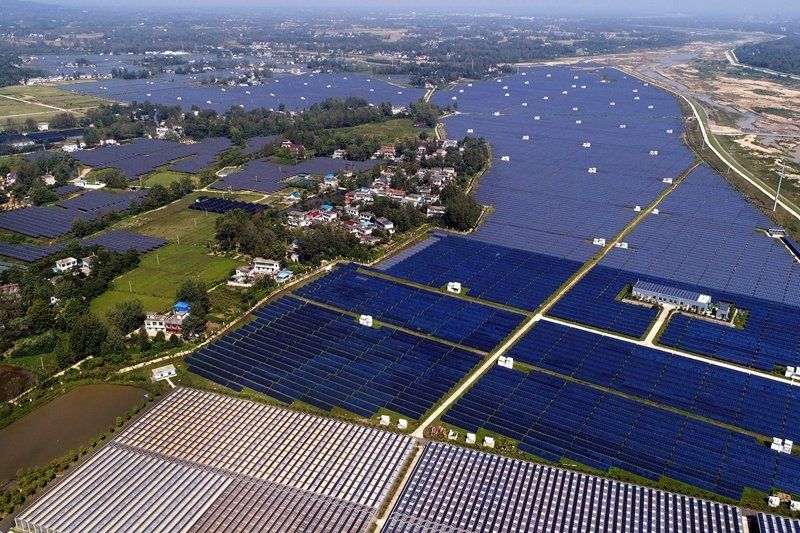The Great Net Zero Deception
News & Social Media / Post
Net Zero is a dangerous fantasy

Across the nation, developers are rubbing their hands with glee at the prospect of receiving vast subsidies for plastering the countryside with useless solar panels. Nobody wins from this policy except for the already rich. If you own the land and have sufficient capital to turn good farm land over to black rectangles then you’re quids in.
It says a lot about our current trade and agriculture policy that there’s little money to be made by using the land to produce food. We’re instead looking at plastering our green and pleasant land with hectares of panels to produce very little energy.
UKIP opposes the development of solar farms. To begin with the UK is not known to be the sunniest of places and solar will mainly produce energy when we need it the least. The only way this could work (in theory) is by storing the energy in batteries. Battery storage at scale, however, simply isn’t a viable proposition. Stored energy rapidly degrades and to cope with the intermittency of renewables, we’d need enough to last weeks and months. Battery storage has only limited use as as short term compensator, taking the place of system inertia that came with more conventional generation.
From whichever angle you examine Net Zero, the transition to “green energy” is underpinned by some childishly optimistic assumptions, with no regard to the astronomical costs involved – which are only going to rise. A new analysis shows that even with three times the installed renewable capacity, we have little hope of meeting the Net Zero target, and it’s all on the faulty presumption that battery storage can plug the gaps. We’d need 100,000 times the Minety battery, Europe’s largest operating battery – and for everything to be performing in optimal conditions.
Renewable energy companies claim that their “green energy” is cheaper, quoting the price they sell to the grid, but that doesn't take into account the costs of batteries and the complete re-engineering of the grid to cope with intermittent supplies. We are told this must work in conjunction with demand side management, but it’s hard to establish how they will bring down energy demand when they’re presently driving us all towards heat pumps and electric cars. Not only are we having to pay through our bills for the complete transformation of the energy grid, we have to fork out for more expensive cars and new heating systems – whether we can afford it or not.
The green lobby has gone into overdrive to stop any new fracking, claiming that it won’t bring down our bills. They may be right, but to say that their Net Zero transition is in any way the cheaper option, or even technically viable is a flat lie. Moreover, solar requires forty times the area of a fracking site to produce 1/20 of the energy. There’s nothing green about solar, particularly when you consider the minerals they’re made of, where they come from and how they’re extracted.
The green energy transition is a techno-utopian fantasy, and though it sounds superficially plausible, it fails any reality test you want to throw at it. It may be a desirable model for the distant future, but in all likelihood a better idea will arrive in the meantime. Net Zero, though, means ramming through half baked ideas at enormous cost, at a time when we can least afford it.
It’s all very well quoting the factory gate efficiency stats for heat pumps and and the installed capacity of wind turbines, but it’s how it all plays out in the real world that matters. Will a heat pump withstand a salty north sea gale or wet Pennine fog for months on end? What happens when the wind doesn’t blow? How do the costs stack up when there’s a global rush for minerals and industrial transmission cables? There are too many technical questions to which all we get is obfuscation and more fantasising.
The reality of renewables means we’re paying substantially more for grid balancing in the dead of winter. The UK has very limited coal flexibility to call on when the wind drops, making the system reliant on gas-fired units, for which spot prices rose from 126 pence per therm Sept. 1 to 200 p/therm on Sept. 30. Meanwhile, subsidies for offshore wind continue to rise. Ramping gas plant up and down to support wind means we're paying top dollar for gas to burn it in the least efficient way.
Elsewhere, we see reality intruding on the rollout of EVs. An automotive journalist describing his recent experience notes that a trip that should take about an hour and a half took him the better part of five hours in an EV. When they say electric cars are cheaper to run, they place no value on your time. Moreover, there’s an inherent sexism to it in that nobody has thought about the potential danger to women as they’re forced to stand around at night waiting for their car to charge.
The danger here is that without a reality check on Net Zero, we’ll build all that extra renewable infrastructure but still face exactly the same energy crunch only to find we’ve maxed the national credit card and the public simply doesn’t have the spare cash to pay more taxes. We’re then looking at energy and fuel rationing. We are told that Net Zero means cheaper, greener electricity but what it means in practice is a more austere lifestyle with less freedom to travel. This is not human progress.
With geopolitical stresses rising, food and fuel prices going up, and wages stagnating, it is the duty of any government to prioritise the cheapest energy it can. Successive administrations have dropped the ball, largely outsourcing energy policy to the EU, meaning there is now no quick fix, and nothing that will make a dent in under a decade. Consequently all options must be on the table even if that means fracking, new north sea exploration and re-opening coal mines. The delusions of eco-fanatics will have to wait.
Recent National News











